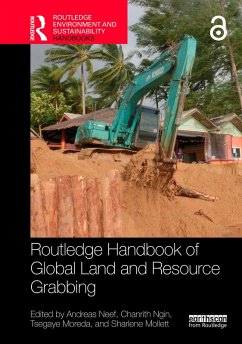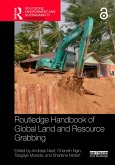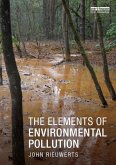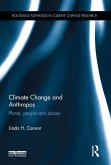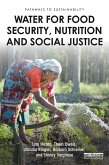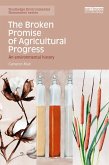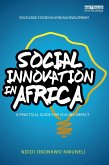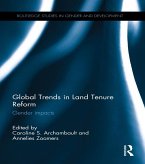Routledge Handbook of Global Land and Resource Grabbing (eBook, ePUB)
Redaktion: Neef, Andreas; Mollett, Sharlene; Moreda, Tsegaye; Ngin, Chanrith
0,99 €
0,99 €
inkl. MwSt.
Sofort per Download lieferbar

0 °P sammeln
0,99 €
Als Download kaufen

0,99 €
inkl. MwSt.
Sofort per Download lieferbar

0 °P sammeln
Jetzt verschenken
Alle Infos zum eBook verschenken
0,99 €
inkl. MwSt.
Sofort per Download lieferbar
Alle Infos zum eBook verschenken

0 °P sammeln
Routledge Handbook of Global Land and Resource Grabbing (eBook, ePUB)
Redaktion: Neef, Andreas; Mollett, Sharlene; Moreda, Tsegaye; Ngin, Chanrith
- Format: ePub
- Merkliste
- Auf die Merkliste
- Bewerten Bewerten
- Teilen
- Produkt teilen
- Produkterinnerung
- Produkterinnerung

Bitte loggen Sie sich zunächst in Ihr Kundenkonto ein oder registrieren Sie sich bei
bücher.de, um das eBook-Abo tolino select nutzen zu können.
Hier können Sie sich einloggen
Hier können Sie sich einloggen
Sie sind bereits eingeloggt. Klicken Sie auf 2. tolino select Abo, um fortzufahren.

Bitte loggen Sie sich zunächst in Ihr Kundenkonto ein oder registrieren Sie sich bei bücher.de, um das eBook-Abo tolino select nutzen zu können.
This handbook provides a cutting-edge, comprehensive overview of global land and resource grabbing.
- Geräte: eReader
- ohne Kopierschutz
- eBook Hilfe
- Größe: 4.33MB
Andere Kunden interessierten sich auch für
![Routledge Handbook of Global Land and Resource Grabbing (eBook, PDF) Routledge Handbook of Global Land and Resource Grabbing (eBook, PDF)]() Routledge Handbook of Global Land and Resource Grabbing (eBook, PDF)0,99 €
Routledge Handbook of Global Land and Resource Grabbing (eBook, PDF)0,99 €![The Elements of Environmental Pollution (eBook, ePUB) The Elements of Environmental Pollution (eBook, ePUB)]() John RieuwertsThe Elements of Environmental Pollution (eBook, ePUB)72,95 €
John RieuwertsThe Elements of Environmental Pollution (eBook, ePUB)72,95 €![Climate Change and Anthropos (eBook, ePUB) Climate Change and Anthropos (eBook, ePUB)]() Linda ConnorClimate Change and Anthropos (eBook, ePUB)25,95 €
Linda ConnorClimate Change and Anthropos (eBook, ePUB)25,95 €![Water for Food Security, Nutrition and Social Justice (eBook, ePUB) Water for Food Security, Nutrition and Social Justice (eBook, ePUB)]() Lyla MehtaWater for Food Security, Nutrition and Social Justice (eBook, ePUB)33,95 €
Lyla MehtaWater for Food Security, Nutrition and Social Justice (eBook, ePUB)33,95 €![The Broken Promise of Agricultural Progress (eBook, ePUB) The Broken Promise of Agricultural Progress (eBook, ePUB)]() Cameron MuirThe Broken Promise of Agricultural Progress (eBook, ePUB)38,95 €
Cameron MuirThe Broken Promise of Agricultural Progress (eBook, ePUB)38,95 €![Social Innovation In Africa (eBook, ePUB) Social Innovation In Africa (eBook, ePUB)]() Ndidi Okonkwo NwuneliSocial Innovation In Africa (eBook, ePUB)38,95 €
Ndidi Okonkwo NwuneliSocial Innovation In Africa (eBook, ePUB)38,95 €![Global Trends in Land Tenure Reform (eBook, ePUB) Global Trends in Land Tenure Reform (eBook, ePUB)]() Global Trends in Land Tenure Reform (eBook, ePUB)46,95 €
Global Trends in Land Tenure Reform (eBook, ePUB)46,95 €-
-
-
This handbook provides a cutting-edge, comprehensive overview of global land and resource grabbing.
Dieser Download kann aus rechtlichen Gründen nur mit Rechnungsadresse in A, B, BG, CY, CZ, D, DK, EW, E, FIN, F, GR, HR, H, IRL, I, LT, L, LR, M, NL, PL, P, R, S, SLO, SK ausgeliefert werden.
Produktdetails
- Produktdetails
- Verlag: Taylor & Francis
- Seitenzahl: 511
- Erscheinungstermin: 12. Juni 2023
- Englisch
- ISBN-13: 9781000902372
- Artikelnr.: 68161768
- Verlag: Taylor & Francis
- Seitenzahl: 511
- Erscheinungstermin: 12. Juni 2023
- Englisch
- ISBN-13: 9781000902372
- Artikelnr.: 68161768
Andreas Neef is Professor in Development Studies at the University of Auckland, New Zealand. He has researched and published in the areas of global land and resource grabbing, climate mobilities and mobility justice, climate change adaptation, post-disaster response and recovery, and community resilience. He is the author of Tourism, Land Grabs and Displacement: The Dark Side of the Feel-Good Industry (Routledge, 2021). Chanrith Ngin is Senior Research Fellow and Director of the Centre for Natural Resources and Environment at the Cambodia Development Resource Institute. He also serves as Honorary Academic at the University of Auckland, New Zealand. Earlier, he was a Senior Research Fellow and Professional Teaching Fellow at the University of Auckland, a Designated Professor at Nagoya University Cambodia Satellite Campus, and Dean of the Faculty of Development Studies at the Royal University of Phnom Penh, Cambodia. Tsegaye Moreda is Assistant Professor of Agrarian and Rural Studies at the International Institute of Social Studies (ISS) at Erasmus University Rotterdam, the Netherlands. His research interests are in the political economy of development, with a particular focus on agricultural, rural and environmental policies; land politics, rural-urban relations and synergies; natural resource politics and their implications for the environment, livelihoods, conflict and social justice. Sharlene Mollett is Associate Professor and Distinguished Professor in Feminist Cultural Geography, Nature and Society in the Departments of Human Geography and Global Development Studies at the University of Toronto, Canada. Her work interrogates Indigenous and Afro-descendant land struggles in Central America.
Chapter 1. Global Land and Resource Grabbing: An Introduction
Andreas Neef, Sharlene Mollett, Chanrith Ngin and Tsegaye Moreda
Part 1: Historical Trajectories of Land and Resource Grabbing
Chapter 2. From the Colonial Doctrine of Discovery to Contemporary Land
Grabs: "Dignity Taking" against the Poor
Thembela Kepe
Chapter 3. Riro Whenua Atu, Hoki Whenua Mai: Land Grabbing in British
Settler States and Contested Land Restitution to M¿ori in Aotearoa New
Zealand
Margaret Mutu
Chapter 4. Ruptures and Continuities: How the Global Land "Rush"
(Re)produces Slow Violence on Latin America's Resource Frontiers
Joel E. Correia
Part 2: Enabling Mechanisms and Governance of Land and Resource Grabbing
Chapter 5. Capture Land: Anti-Squatting Policy as Processual Land Grab in
Jamaica
Rachel Goffe
Chapter 6. The Rule of Technocrats? Historical Conditions for a Land Grab
in Northern Guatemala
Kevin Gould
Chapter 7. Governing Land Concessions in Laos
Miles Kenney-Lazar, Oliver Schönweger, Peter Messerli, and Vong Nanhthavong
Part 3: Large-Scale Land Acquisitions for Food, Feed and Biofuels
Chapter 8. Sugar Agro-Extractivism: Land Enclosures, Contract Farming and
the Sugar Frontier in Africa
Giuliano Martiniello
Chapter 9. Conceptualizing Contract Farming in the Global Land Grabbing
Debate
Mark Vicol and Helena Pérez Niño
Chapter 10. GMOs, the Land Grab, and Epistemological Enclosures
Lindsay Naylor
Part 4: Taking Land for Conservation, Eco-Tourism, Renewable Energy and
Carbon Markets
Chapter 11. Green Territoriality and Resource Extraction in Cambodia
Sarah Milne, Tim Frewer, and Sango Mahanty
Chapter 12. Towards Climate-Smart Land Policy: Land Grabbing under a
Changing Political Landscape in Mozambique
Natacha Bruna and Aires A. Mbanze
Chapter 13. Renewables Grabbing: Land and Resource Appropriations in the
Global Energy Transition
Arnim Scheidel, Alevgul H. Sorman, Sofia Avila, Daniela Del Bene, and Jonas
Ott
Chapter 14. Geospatial Technologies in Tourism Land and Resource Grabs:
Evidence from Guatemala's Protected Areas
Laura Aileen Sauls and Jennifer A. Devine
Part 5: Land Grabbing by Extractive Industries - Fossil Fuels, Minerals and
Metals
Chapter 15. Arctic Resource Extraction in the Context of Climate Crises and
Ecological Collapses
Markus Kröger
Chapter 16. Territorial Control, Dispossession and Resistance: The
Political Economy of Large-Scale Mining in Asia
Pascale Hatcher and Etienne Roy Grégoire
Chapter 17. Phosphate Mining in Distant Places: The Dark Side of New
Zealand's Agricultural Economic Success
Catherine Alexander, Katerina Teaiwa, and Andreas Neef
Part 6: Blue Grabbing - The Global Rush for Freshwater and Marine Resources
Chapter 18. Cases of Water Grabbing in Waterscape Developments in India
Mansee Bal Bhargava
Chapter 19. The Historical Assembly of Oceania's Deep-Sea Mining Frontier
Oliver Lilford and Matthew G. Allen
Chapter 20. Resource Grabbing and the Blue Commons: The Evolution of
Institutions in Scallop Production in Sechura Bay, Peru
Achim Schlüter, Lotta Clara Kluger, María Garteizgogeascoa, and Gerardo
Damonte
Chapter 21. Coastal Grabbing by Extractive Industries in the South Pacific:
The Case of Fiji
Glenn Finau, Renata Varea, Rufino Varea, Sivendra Michael, and Andreas Neef
Part 7: Land Grabs for Large Infrastructure Projects
Chapter 22. Corridors of Connectivity and Infrastructural Land Grabbing in
Laos
Jessica DiCarlo and Kearrin Sims
Chapter 23. Large Infrastructure Projects and Cascading Land Grabs: The
Case of Northern Kenya
Evelyne Atieno Owino, Kennedy Mkutu, and Charis Enns
Chapter 24. The Great 'Anti-Politics' Progress Machine: Mega-Infrastructure
Projects, Disenchanted Institutional Change and Dramas of Grabbed Commons
Tobias Haller and Samuel Weissman
Part 8: Urban Land Grabs and Special Economic Zones
Chapter 25. Urban Land Grabs: An Overview of the Issues
Kei Otsuki, Murtah Shannon, Griet Steel, and Femke van Noorloos
Chapter 26. History and Contemporary Displacement in Suva's Informal
Settlements
Eberhard Weber, Camari Koto, Andreas Kopf, Maelin Bhagwan, Asenaca
Nawaqalevu, Nicholas Halter, and Koini Vamosi
Chapter 27. Transnational NGO Advocacy to Address Land Grabbing Injustices:
The Case of the Thilawa Special Economic Zone in Myanmar
Setsuko Matsuzawa
Part 9: Land and Resource Grabbing: Resistance, Restitution and Remedies
Chapter 28. After the Rubber Boom: A Cautionary Tale from Southern Laos and
Northeastern Cambodia
Ian G. Baird
Chapter 29. Gender and Dispossession in India: Dynamics of Women's
Participation in Anti-Land Grabbing Struggles
Saba Joshi
Chapter 30. The Role of Emotions in Resistance Movements against Land and
Resource Grabs: New Evidence from Cambodia
Alice Beban and Sochanny Hak
Chapter 31. Filling Gaps in International Human Rights Law to Address
Global Land and Resource Grabbing - Extraterritorial Human Rights Law
Obligations of States and the Rights of Future Generations
Fons Coomans, Rolf Künnemann, and Andreas Neef
Andreas Neef, Sharlene Mollett, Chanrith Ngin and Tsegaye Moreda
Part 1: Historical Trajectories of Land and Resource Grabbing
Chapter 2. From the Colonial Doctrine of Discovery to Contemporary Land
Grabs: "Dignity Taking" against the Poor
Thembela Kepe
Chapter 3. Riro Whenua Atu, Hoki Whenua Mai: Land Grabbing in British
Settler States and Contested Land Restitution to M¿ori in Aotearoa New
Zealand
Margaret Mutu
Chapter 4. Ruptures and Continuities: How the Global Land "Rush"
(Re)produces Slow Violence on Latin America's Resource Frontiers
Joel E. Correia
Part 2: Enabling Mechanisms and Governance of Land and Resource Grabbing
Chapter 5. Capture Land: Anti-Squatting Policy as Processual Land Grab in
Jamaica
Rachel Goffe
Chapter 6. The Rule of Technocrats? Historical Conditions for a Land Grab
in Northern Guatemala
Kevin Gould
Chapter 7. Governing Land Concessions in Laos
Miles Kenney-Lazar, Oliver Schönweger, Peter Messerli, and Vong Nanhthavong
Part 3: Large-Scale Land Acquisitions for Food, Feed and Biofuels
Chapter 8. Sugar Agro-Extractivism: Land Enclosures, Contract Farming and
the Sugar Frontier in Africa
Giuliano Martiniello
Chapter 9. Conceptualizing Contract Farming in the Global Land Grabbing
Debate
Mark Vicol and Helena Pérez Niño
Chapter 10. GMOs, the Land Grab, and Epistemological Enclosures
Lindsay Naylor
Part 4: Taking Land for Conservation, Eco-Tourism, Renewable Energy and
Carbon Markets
Chapter 11. Green Territoriality and Resource Extraction in Cambodia
Sarah Milne, Tim Frewer, and Sango Mahanty
Chapter 12. Towards Climate-Smart Land Policy: Land Grabbing under a
Changing Political Landscape in Mozambique
Natacha Bruna and Aires A. Mbanze
Chapter 13. Renewables Grabbing: Land and Resource Appropriations in the
Global Energy Transition
Arnim Scheidel, Alevgul H. Sorman, Sofia Avila, Daniela Del Bene, and Jonas
Ott
Chapter 14. Geospatial Technologies in Tourism Land and Resource Grabs:
Evidence from Guatemala's Protected Areas
Laura Aileen Sauls and Jennifer A. Devine
Part 5: Land Grabbing by Extractive Industries - Fossil Fuels, Minerals and
Metals
Chapter 15. Arctic Resource Extraction in the Context of Climate Crises and
Ecological Collapses
Markus Kröger
Chapter 16. Territorial Control, Dispossession and Resistance: The
Political Economy of Large-Scale Mining in Asia
Pascale Hatcher and Etienne Roy Grégoire
Chapter 17. Phosphate Mining in Distant Places: The Dark Side of New
Zealand's Agricultural Economic Success
Catherine Alexander, Katerina Teaiwa, and Andreas Neef
Part 6: Blue Grabbing - The Global Rush for Freshwater and Marine Resources
Chapter 18. Cases of Water Grabbing in Waterscape Developments in India
Mansee Bal Bhargava
Chapter 19. The Historical Assembly of Oceania's Deep-Sea Mining Frontier
Oliver Lilford and Matthew G. Allen
Chapter 20. Resource Grabbing and the Blue Commons: The Evolution of
Institutions in Scallop Production in Sechura Bay, Peru
Achim Schlüter, Lotta Clara Kluger, María Garteizgogeascoa, and Gerardo
Damonte
Chapter 21. Coastal Grabbing by Extractive Industries in the South Pacific:
The Case of Fiji
Glenn Finau, Renata Varea, Rufino Varea, Sivendra Michael, and Andreas Neef
Part 7: Land Grabs for Large Infrastructure Projects
Chapter 22. Corridors of Connectivity and Infrastructural Land Grabbing in
Laos
Jessica DiCarlo and Kearrin Sims
Chapter 23. Large Infrastructure Projects and Cascading Land Grabs: The
Case of Northern Kenya
Evelyne Atieno Owino, Kennedy Mkutu, and Charis Enns
Chapter 24. The Great 'Anti-Politics' Progress Machine: Mega-Infrastructure
Projects, Disenchanted Institutional Change and Dramas of Grabbed Commons
Tobias Haller and Samuel Weissman
Part 8: Urban Land Grabs and Special Economic Zones
Chapter 25. Urban Land Grabs: An Overview of the Issues
Kei Otsuki, Murtah Shannon, Griet Steel, and Femke van Noorloos
Chapter 26. History and Contemporary Displacement in Suva's Informal
Settlements
Eberhard Weber, Camari Koto, Andreas Kopf, Maelin Bhagwan, Asenaca
Nawaqalevu, Nicholas Halter, and Koini Vamosi
Chapter 27. Transnational NGO Advocacy to Address Land Grabbing Injustices:
The Case of the Thilawa Special Economic Zone in Myanmar
Setsuko Matsuzawa
Part 9: Land and Resource Grabbing: Resistance, Restitution and Remedies
Chapter 28. After the Rubber Boom: A Cautionary Tale from Southern Laos and
Northeastern Cambodia
Ian G. Baird
Chapter 29. Gender and Dispossession in India: Dynamics of Women's
Participation in Anti-Land Grabbing Struggles
Saba Joshi
Chapter 30. The Role of Emotions in Resistance Movements against Land and
Resource Grabs: New Evidence from Cambodia
Alice Beban and Sochanny Hak
Chapter 31. Filling Gaps in International Human Rights Law to Address
Global Land and Resource Grabbing - Extraterritorial Human Rights Law
Obligations of States and the Rights of Future Generations
Fons Coomans, Rolf Künnemann, and Andreas Neef
Chapter 1. Global Land and Resource Grabbing: An Introduction
Andreas Neef, Sharlene Mollett, Chanrith Ngin and Tsegaye Moreda
Part 1: Historical Trajectories of Land and Resource Grabbing
Chapter 2. From the Colonial Doctrine of Discovery to Contemporary Land
Grabs: "Dignity Taking" against the Poor
Thembela Kepe
Chapter 3. Riro Whenua Atu, Hoki Whenua Mai: Land Grabbing in British
Settler States and Contested Land Restitution to M¿ori in Aotearoa New
Zealand
Margaret Mutu
Chapter 4. Ruptures and Continuities: How the Global Land "Rush"
(Re)produces Slow Violence on Latin America's Resource Frontiers
Joel E. Correia
Part 2: Enabling Mechanisms and Governance of Land and Resource Grabbing
Chapter 5. Capture Land: Anti-Squatting Policy as Processual Land Grab in
Jamaica
Rachel Goffe
Chapter 6. The Rule of Technocrats? Historical Conditions for a Land Grab
in Northern Guatemala
Kevin Gould
Chapter 7. Governing Land Concessions in Laos
Miles Kenney-Lazar, Oliver Schönweger, Peter Messerli, and Vong Nanhthavong
Part 3: Large-Scale Land Acquisitions for Food, Feed and Biofuels
Chapter 8. Sugar Agro-Extractivism: Land Enclosures, Contract Farming and
the Sugar Frontier in Africa
Giuliano Martiniello
Chapter 9. Conceptualizing Contract Farming in the Global Land Grabbing
Debate
Mark Vicol and Helena Pérez Niño
Chapter 10. GMOs, the Land Grab, and Epistemological Enclosures
Lindsay Naylor
Part 4: Taking Land for Conservation, Eco-Tourism, Renewable Energy and
Carbon Markets
Chapter 11. Green Territoriality and Resource Extraction in Cambodia
Sarah Milne, Tim Frewer, and Sango Mahanty
Chapter 12. Towards Climate-Smart Land Policy: Land Grabbing under a
Changing Political Landscape in Mozambique
Natacha Bruna and Aires A. Mbanze
Chapter 13. Renewables Grabbing: Land and Resource Appropriations in the
Global Energy Transition
Arnim Scheidel, Alevgul H. Sorman, Sofia Avila, Daniela Del Bene, and Jonas
Ott
Chapter 14. Geospatial Technologies in Tourism Land and Resource Grabs:
Evidence from Guatemala's Protected Areas
Laura Aileen Sauls and Jennifer A. Devine
Part 5: Land Grabbing by Extractive Industries - Fossil Fuels, Minerals and
Metals
Chapter 15. Arctic Resource Extraction in the Context of Climate Crises and
Ecological Collapses
Markus Kröger
Chapter 16. Territorial Control, Dispossession and Resistance: The
Political Economy of Large-Scale Mining in Asia
Pascale Hatcher and Etienne Roy Grégoire
Chapter 17. Phosphate Mining in Distant Places: The Dark Side of New
Zealand's Agricultural Economic Success
Catherine Alexander, Katerina Teaiwa, and Andreas Neef
Part 6: Blue Grabbing - The Global Rush for Freshwater and Marine Resources
Chapter 18. Cases of Water Grabbing in Waterscape Developments in India
Mansee Bal Bhargava
Chapter 19. The Historical Assembly of Oceania's Deep-Sea Mining Frontier
Oliver Lilford and Matthew G. Allen
Chapter 20. Resource Grabbing and the Blue Commons: The Evolution of
Institutions in Scallop Production in Sechura Bay, Peru
Achim Schlüter, Lotta Clara Kluger, María Garteizgogeascoa, and Gerardo
Damonte
Chapter 21. Coastal Grabbing by Extractive Industries in the South Pacific:
The Case of Fiji
Glenn Finau, Renata Varea, Rufino Varea, Sivendra Michael, and Andreas Neef
Part 7: Land Grabs for Large Infrastructure Projects
Chapter 22. Corridors of Connectivity and Infrastructural Land Grabbing in
Laos
Jessica DiCarlo and Kearrin Sims
Chapter 23. Large Infrastructure Projects and Cascading Land Grabs: The
Case of Northern Kenya
Evelyne Atieno Owino, Kennedy Mkutu, and Charis Enns
Chapter 24. The Great 'Anti-Politics' Progress Machine: Mega-Infrastructure
Projects, Disenchanted Institutional Change and Dramas of Grabbed Commons
Tobias Haller and Samuel Weissman
Part 8: Urban Land Grabs and Special Economic Zones
Chapter 25. Urban Land Grabs: An Overview of the Issues
Kei Otsuki, Murtah Shannon, Griet Steel, and Femke van Noorloos
Chapter 26. History and Contemporary Displacement in Suva's Informal
Settlements
Eberhard Weber, Camari Koto, Andreas Kopf, Maelin Bhagwan, Asenaca
Nawaqalevu, Nicholas Halter, and Koini Vamosi
Chapter 27. Transnational NGO Advocacy to Address Land Grabbing Injustices:
The Case of the Thilawa Special Economic Zone in Myanmar
Setsuko Matsuzawa
Part 9: Land and Resource Grabbing: Resistance, Restitution and Remedies
Chapter 28. After the Rubber Boom: A Cautionary Tale from Southern Laos and
Northeastern Cambodia
Ian G. Baird
Chapter 29. Gender and Dispossession in India: Dynamics of Women's
Participation in Anti-Land Grabbing Struggles
Saba Joshi
Chapter 30. The Role of Emotions in Resistance Movements against Land and
Resource Grabs: New Evidence from Cambodia
Alice Beban and Sochanny Hak
Chapter 31. Filling Gaps in International Human Rights Law to Address
Global Land and Resource Grabbing - Extraterritorial Human Rights Law
Obligations of States and the Rights of Future Generations
Fons Coomans, Rolf Künnemann, and Andreas Neef
Andreas Neef, Sharlene Mollett, Chanrith Ngin and Tsegaye Moreda
Part 1: Historical Trajectories of Land and Resource Grabbing
Chapter 2. From the Colonial Doctrine of Discovery to Contemporary Land
Grabs: "Dignity Taking" against the Poor
Thembela Kepe
Chapter 3. Riro Whenua Atu, Hoki Whenua Mai: Land Grabbing in British
Settler States and Contested Land Restitution to M¿ori in Aotearoa New
Zealand
Margaret Mutu
Chapter 4. Ruptures and Continuities: How the Global Land "Rush"
(Re)produces Slow Violence on Latin America's Resource Frontiers
Joel E. Correia
Part 2: Enabling Mechanisms and Governance of Land and Resource Grabbing
Chapter 5. Capture Land: Anti-Squatting Policy as Processual Land Grab in
Jamaica
Rachel Goffe
Chapter 6. The Rule of Technocrats? Historical Conditions for a Land Grab
in Northern Guatemala
Kevin Gould
Chapter 7. Governing Land Concessions in Laos
Miles Kenney-Lazar, Oliver Schönweger, Peter Messerli, and Vong Nanhthavong
Part 3: Large-Scale Land Acquisitions for Food, Feed and Biofuels
Chapter 8. Sugar Agro-Extractivism: Land Enclosures, Contract Farming and
the Sugar Frontier in Africa
Giuliano Martiniello
Chapter 9. Conceptualizing Contract Farming in the Global Land Grabbing
Debate
Mark Vicol and Helena Pérez Niño
Chapter 10. GMOs, the Land Grab, and Epistemological Enclosures
Lindsay Naylor
Part 4: Taking Land for Conservation, Eco-Tourism, Renewable Energy and
Carbon Markets
Chapter 11. Green Territoriality and Resource Extraction in Cambodia
Sarah Milne, Tim Frewer, and Sango Mahanty
Chapter 12. Towards Climate-Smart Land Policy: Land Grabbing under a
Changing Political Landscape in Mozambique
Natacha Bruna and Aires A. Mbanze
Chapter 13. Renewables Grabbing: Land and Resource Appropriations in the
Global Energy Transition
Arnim Scheidel, Alevgul H. Sorman, Sofia Avila, Daniela Del Bene, and Jonas
Ott
Chapter 14. Geospatial Technologies in Tourism Land and Resource Grabs:
Evidence from Guatemala's Protected Areas
Laura Aileen Sauls and Jennifer A. Devine
Part 5: Land Grabbing by Extractive Industries - Fossil Fuels, Minerals and
Metals
Chapter 15. Arctic Resource Extraction in the Context of Climate Crises and
Ecological Collapses
Markus Kröger
Chapter 16. Territorial Control, Dispossession and Resistance: The
Political Economy of Large-Scale Mining in Asia
Pascale Hatcher and Etienne Roy Grégoire
Chapter 17. Phosphate Mining in Distant Places: The Dark Side of New
Zealand's Agricultural Economic Success
Catherine Alexander, Katerina Teaiwa, and Andreas Neef
Part 6: Blue Grabbing - The Global Rush for Freshwater and Marine Resources
Chapter 18. Cases of Water Grabbing in Waterscape Developments in India
Mansee Bal Bhargava
Chapter 19. The Historical Assembly of Oceania's Deep-Sea Mining Frontier
Oliver Lilford and Matthew G. Allen
Chapter 20. Resource Grabbing and the Blue Commons: The Evolution of
Institutions in Scallop Production in Sechura Bay, Peru
Achim Schlüter, Lotta Clara Kluger, María Garteizgogeascoa, and Gerardo
Damonte
Chapter 21. Coastal Grabbing by Extractive Industries in the South Pacific:
The Case of Fiji
Glenn Finau, Renata Varea, Rufino Varea, Sivendra Michael, and Andreas Neef
Part 7: Land Grabs for Large Infrastructure Projects
Chapter 22. Corridors of Connectivity and Infrastructural Land Grabbing in
Laos
Jessica DiCarlo and Kearrin Sims
Chapter 23. Large Infrastructure Projects and Cascading Land Grabs: The
Case of Northern Kenya
Evelyne Atieno Owino, Kennedy Mkutu, and Charis Enns
Chapter 24. The Great 'Anti-Politics' Progress Machine: Mega-Infrastructure
Projects, Disenchanted Institutional Change and Dramas of Grabbed Commons
Tobias Haller and Samuel Weissman
Part 8: Urban Land Grabs and Special Economic Zones
Chapter 25. Urban Land Grabs: An Overview of the Issues
Kei Otsuki, Murtah Shannon, Griet Steel, and Femke van Noorloos
Chapter 26. History and Contemporary Displacement in Suva's Informal
Settlements
Eberhard Weber, Camari Koto, Andreas Kopf, Maelin Bhagwan, Asenaca
Nawaqalevu, Nicholas Halter, and Koini Vamosi
Chapter 27. Transnational NGO Advocacy to Address Land Grabbing Injustices:
The Case of the Thilawa Special Economic Zone in Myanmar
Setsuko Matsuzawa
Part 9: Land and Resource Grabbing: Resistance, Restitution and Remedies
Chapter 28. After the Rubber Boom: A Cautionary Tale from Southern Laos and
Northeastern Cambodia
Ian G. Baird
Chapter 29. Gender and Dispossession in India: Dynamics of Women's
Participation in Anti-Land Grabbing Struggles
Saba Joshi
Chapter 30. The Role of Emotions in Resistance Movements against Land and
Resource Grabs: New Evidence from Cambodia
Alice Beban and Sochanny Hak
Chapter 31. Filling Gaps in International Human Rights Law to Address
Global Land and Resource Grabbing - Extraterritorial Human Rights Law
Obligations of States and the Rights of Future Generations
Fons Coomans, Rolf Künnemann, and Andreas Neef
